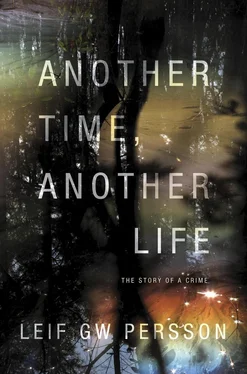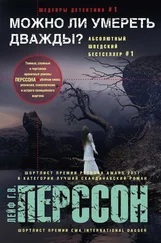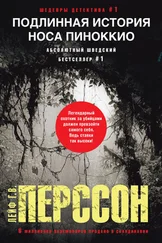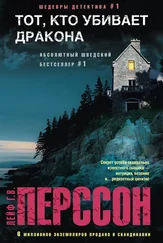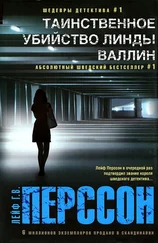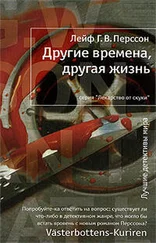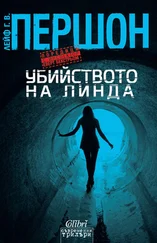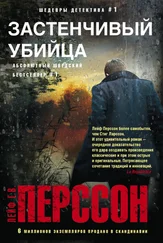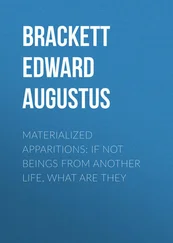“The hell it was,” Jarnebring objected. “Not that I met Eriksson while he was alive, but I still got the distinct impression that he was a real little coward.”
“But not this time,” said Johansson, “because he was not physically afraid of this particular perpetrator.”
“I see,” said Jarnebring, smiling broadly. “You’re onto colleague Bäckström’s line, that after all it was a little fairy we’re searching for.”
“No,” said Johansson. “It’s someone else we’re looking for.”
“Someone that Eriksson knew, someone he wasn’t afraid of, but instead someone with whom even Eriksson could feel big and strong,” said Jarnebring.
“Yes,” said Johansson. Unfortunately that’s the way it is, he thought.
“Damn, Lars, say what you want about old unsolved murders, but they’re good for the appetite,” Jarnebring said an hour later as they sat at their usual table at Johansson’s regular place and had just been served a baked sandwich of Parma ham, mozzarella, basil, and tomato as a little prelude to the lamb filet that would come when it was time to get serious.
“Too bad it has to be an ordinary Tuesday,” said Johansson vaguely.
“You’re thinking of a small one,” said Jarnebring.
“What makes you think that?” Johansson asked evasively.
“I’m a cop,” said Jarnebring. “I’ve been a cop my whole adult life — and I’ve known you just as long — and because Pia is out of town anyway and I am free myself, I get the idea that you, in your dark Norrland way, are talking about a little shot, despite the fact that it’s only Tuesday.”
“What the hell should we do?” said Johansson hesitantly. It is only Tuesday after all, he thought.
“Order two good-sized shots and pretend it’s Friday,” Jarnebring decided.
35
Wednesday, April 5, 2000
It was Holt’s suggestion, a sudden idea, a pure hunch that would probably prove to be completely wrong.
“It’s worth trying anyway,” Johansson said, which was why he was sitting with Wiklander in his office early Wednesday morning, refining tactics. Unusually alert and sober besides, despite the previous evening.
“I see you’ve already spoken with our colleague Holt,” said Johansson, nodding toward the little gold pin in the form of a trident that now adorned the lapel of Wiklander’s jacket.
“Old coast commando,” Wiklander nodded, not without pride as it appeared.
“Yes, be happy you don’t have to wear a fake mustache,” said Johansson, who was in the absolute best of moods because he was being let out into the field again. Despite his high rank, and despite all the old rust he was no doubt dragging along with him.
The day before, Holt had suddenly happened to think of Eriksson’s neighbor, the major, about whom she had had her suspicions after she and Jarnebring had interviewed him ten years ago.
“I had the distinct impression he was hiding something from us,” Holt had explained to her boss. “He was a guarded type, very guarded, and he had peepholes in the door and a good view of both the hallway and the stairwell. Because there had been a lot of racket at Eriksson’s the night of the murder, I thought it was more than probable that he had tried to peep out and see what was happening. Possibly he saw the perpetrator when he or she left. At that time I was completely convinced that the person we were searching for was a man,” she clarified. “All of us were, not least Bäckström.”
“Why didn’t the major say so then?” asked Johansson. “About whether he’d seen anything.”
“For several reasons, I think,” said Holt. “First, he clearly seemed to dislike Eriksson. Second, he didn’t like the police. That was probably enough for him to decide to keep his mouth shut. And it may have been much simpler too,” she added.
“What do you mean?” asked Johansson.
“He was extremely anxious to show what an old warrior he was. For a while I almost thought he was going to show us an old bullet wound from the Finnish war he was boasting about. But maybe when he saw something he was just afraid, like anyone else would be, or out of cowardice or laziness he didn’t want to be drawn into something. I’m sure he would rather bite his tongue off than admit to something like that.”
“Yes,” said Johansson, nodding. “But isn’t it still most likely that he didn’t see anything?”
“Yes,” said Holt. “That’s the most likely — that I’m completely wrong.”
“It’s worth trying anyway,” said Johansson. “But why do you want me in particular to do it?” he added. “You should know it’s been a while.” Even if I am flattered that she asked, of course, he thought.
“I think you’re just the right type to pry open that old cuss,” Holt explained.
“Do I look like I might conceivably share his political opinions?” Johansson asked. Think carefully about what you say, Holt, he thought.
“No,” said Holt, looking at Johansson, “but you definitely look like a man with strong opinions.”
“Nice,” said Johansson. And how nice is it on a scale from one to ten, he thought, for he had heard his wife say that.
“He scarcely noticed my presence,” Holt explained. “On the other hand he took note of Jarnebring — who doesn’t,” said Holt, smiling faintly. “But at the same time I think he felt that Jarnebring was maybe a little too simple for him to condescend to take seriously.”
“I think I’m starting to get an idea of the type,” said Johansson.
So now they were sitting there, at home with the major in his apartment on Rådmansgatan.
“The secret police and the second highest in command if I’ve understood this correctly,” said the major, nodding toward Johansson as he set Johansson’s business card down on the desk, behind which he had settled himself. “To what do I owe this honor?”
“It concerns a neighbor of yours, Major Carlgren, a man who was murdered in 1989,” Johansson explained.
“That little shit,” the major said amiably. “Why in the name of heaven should the secret police be concerned about him? You weren’t interested in him when he was still alive.”
“As you’ll understand, Major, I am prevented from going into any details,” said Johansson, looking sternly at the person he was speaking with. “But my colleague Wiklander here and I are following up a tip that we got from our colleagues in the military intelligence service,” Johansson concluded, nodding in the direction of Wiklander and the fish spear on his jacket. In a way that is what we’re doing, thought Johansson, even if this was the last thing the mysterious informant had had in mind when he brought new life to the Eriksson case.
“Coast commandos,” said the major, nodding with approval toward the lapel of Wiklander’s jacket.
“I am of course well acquainted with your military experience, Major,” said Johansson, who had decided in advance to pour it on thick. “By the way, I had a close relative myself who fought on the Finnish side—”
“So what was his name?” the major interrupted, looking guardedly at Johansson.
“His name was Johansson, Petrus Johansson. He was a commando with the rank of corporal when he fell at Tolvajärvi.”
“Was that your father?” asked the major.
“My uncle,” Johansson lied. It was bad enough that it had been his father’s crazy cousin about whom the older generations in the Johansson family still talked an unbelievable lot of shit whenever they got the chance.
“I know who he was,” said the major, nodding. “I never met him but I know who he was. Corporal Petrus Johansson died a hero’s death and you have my sincere sympathy.”
“Thank you,” said Johansson, who was shaken to his core because an eighty-year-old major had just got the idea that Johansson had been born no later than 1940. I’ll have to start dieting, he thought.
Читать дальше
